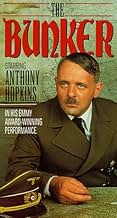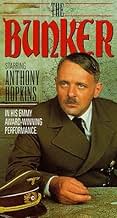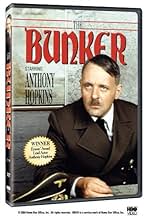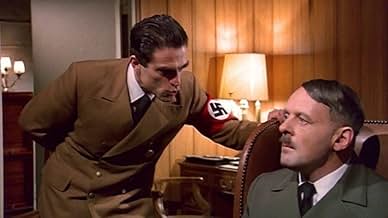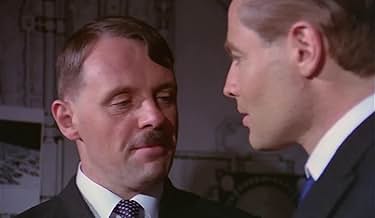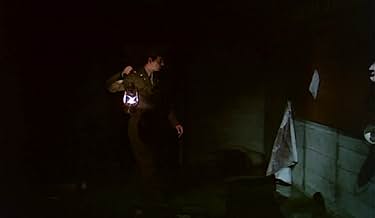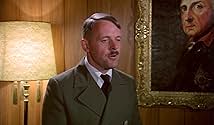IMDb RATING
6.9/10
2.8K
YOUR RATING
Dramatization depicting the events surrounding Adolf Hitler's (Sir Anthony Hopkins) last weeks in and around his underground bunker in Berlin before and during the battle for the city.Dramatization depicting the events surrounding Adolf Hitler's (Sir Anthony Hopkins) last weeks in and around his underground bunker in Berlin before and during the battle for the city.Dramatization depicting the events surrounding Adolf Hitler's (Sir Anthony Hopkins) last weeks in and around his underground bunker in Berlin before and during the battle for the city.
- Director
- Writers
- Stars
- Won 1 Primetime Emmy
- 1 win & 2 nominations total
Georges Corraface
- Gard SS #1
- (as George Chorafas)
- Director
- Writers
- All cast & crew
- Production, box office & more at IMDbPro
Featured reviews
10tfn65125
This is another one of those inexplicable films that should be out on DVD by now but isn't. There is so much 'dross' being released, yet this minor masterpiece with excellent performances from Hopkins remains locked away! A region 1 release is rumoured, but no date yet. It's been a while since I saw it, but I do remember being very impressed at the time. Another similar 1974 film exists with Alec Guiness playing the Fuhrer; "Hitler, the last ten days". My recollection is that the "Bunker" film had the edge. The Alec Guiness film was spoiled slightly by a series of strange comments from Hitler in his sealed room moments before he and Eva Braun commit suicide (obviously there were no witnesses to record this!). It was as though the film-makers added it in just in case anyone might find themselves admiring the Fuhrer for his resolute position! After the German masterpiece Downfall/ Untergang, it seems crazy not to be able to add this gem of a film to DVD collections crying out for it.........
A stunning portrayal by Hopkins. Unfortunately the other cast members (the male ones anyway) do not look enough like the ghastly originals (!) to be convincing. For example, Goebbels is well enough acted, as are they all, but he just does not have the cadaverous look of Dr. Joseph. The Reich architect Speer is portrayed as far too nice a man. He wasn't. The exception is Bormann. Michael Lonsdale is made to look a little like this detestable man. In bearing, size and demeanor Lonsdale captures the essence of Hitler's right hand man He kept in the background most of the time, but was nonetheless an extremely powerful figure in the Third Reich and his power comes over very well. A good script and well directed, this film is well worth watching, especially now that it is readily available, uncut, on DVD.
What a cast. And what a splendid job they all do in this description of Hitler's last days in the fortified bunker far beneath the Chancellery as World War II was closing in all around the Führer and the remains of his staff. And not one of the actors tries to fake a German accent.
Anthony Hopkins gives the finest portrayal of a living dead man that I've seen. There have been numerous other version, documentary and fictionalized, and some are fine productions but they don't achieve parity. Alec Guiness, for instance, gave us a Hitler who was annoyed by the disintegration of his armies and his plans, an exasperated leader who acts as if the automobile he's just bought is a lemon and not covered by a warantee. Luther Adler showed us a bitter madman. But Hopkins is modulated, quiet, quietly disturbed, his right hand trembling after the attempt on his life the year before. Hopkins' Hitler can no longer raise his injured right arm high enough to give the full salute. It's a stunningly precise and believable portrait. Suspicious, but not a raging paranoid. And under stress he lets loose a startling hiss. It's not surprising that Hopkins does such a good job in the role. He was my co-star in the superior "Road to Wellville" and I gave him a few pointers that helped him over the rough spots. He seemed put out when I charged him ten cents for the tutoring.
The central conflict here is between Hopkins and Albert Speer, his Minister of Arms and War Production. Speer was a brilliant architect and industrialist, a relatively young handsome officer played here by Richard Jordan. Hitler was fond of Speer, considering both of them -- the architect and the erstwhile painter -- to be artists. But now Hitler has issued orders that all of Germany be destroyed before the Allies get to Berlin. Speer objects. Hitler is adamant. Speer develops a plan to introduce poison gas into the vent that supplies air to the underground bunker, which will kill everyone inside, including Hitler. But after the last assassination attempt, Hitler has become double wary and self protective. The plan is dropped and Speer remarks that he'll not try another because "I think I only had one in me." Speer decides instead to agree to the destruction of Germany but will prevent it by bureaucratic stalling and by wrapping the process in red tape.
There are scenes between Hopkins and Jordan that are truly touching. Speer was perhaps Hitler's favorite among his staff. "My good architect; my GENIUS architect." Now Speer is telling him frankly that the war is lost. Well, nobody else is telling der Fürher that the war is lost. They know better, because the penalty for acting on that belief is death. But Hopkins BEGS Jordan for some sign of faith. Okay, Jordan believes the war is lost. But does he have faith in ME? Does he at least have HOPE? "Even THAT would satisfy me." Jordan is desolate and Hopkins is near tears as he implores his friend to give some positive response. It's like watching the tragic breakup of a love affair or a marriage. It seems impossible but Hopkins brings humanity to the most inhumane human being of his century. I can imagine the outcries against a portrait of Hitler that isn't a stereotype.
To make matters worse, we see him flirting with Susan Blakely as his mistress, Eva Braun. But if the viewer needs the usual clichés, they're available in occasional dissolves followed by flashbacks to better times, when Hitler and Speer first met, before Germany became a sewer, before the death factories began to churn out their product. But history is inexorable. As Berlin is encircled, desperate attempts are made to get out, to avoid the vengeful Russians by surrendering to Eisenhower in the west. The atmosphere in the littered and unguarded bunker itself follows secretary Traudl Junge's description -- the men on the remaining staff dance and carouse with the women and drink themselves into a stupor. It was a big party. The party atmosphere was enhanced by the mockery of a marriage between Hitler and Eva Braun. "Do you swear that you are of pure Aryan descent and free of hereditary diseases?" It's impossible not to be moved as the end approaches and Josef Goebbels invites his staff to a farewell party. The camera lingers on the faces of his children, some barely old enough to sing the heroic song, and all of whom he and his wife Magda will shortly kill by cyanide poisoning.
There have been a number of films about Hitler's last days, both feature films and documentaries. This is one of the best. Let's hope it's also the last. Who wants to watch a long, slow suicide?
Anthony Hopkins gives the finest portrayal of a living dead man that I've seen. There have been numerous other version, documentary and fictionalized, and some are fine productions but they don't achieve parity. Alec Guiness, for instance, gave us a Hitler who was annoyed by the disintegration of his armies and his plans, an exasperated leader who acts as if the automobile he's just bought is a lemon and not covered by a warantee. Luther Adler showed us a bitter madman. But Hopkins is modulated, quiet, quietly disturbed, his right hand trembling after the attempt on his life the year before. Hopkins' Hitler can no longer raise his injured right arm high enough to give the full salute. It's a stunningly precise and believable portrait. Suspicious, but not a raging paranoid. And under stress he lets loose a startling hiss. It's not surprising that Hopkins does such a good job in the role. He was my co-star in the superior "Road to Wellville" and I gave him a few pointers that helped him over the rough spots. He seemed put out when I charged him ten cents for the tutoring.
The central conflict here is between Hopkins and Albert Speer, his Minister of Arms and War Production. Speer was a brilliant architect and industrialist, a relatively young handsome officer played here by Richard Jordan. Hitler was fond of Speer, considering both of them -- the architect and the erstwhile painter -- to be artists. But now Hitler has issued orders that all of Germany be destroyed before the Allies get to Berlin. Speer objects. Hitler is adamant. Speer develops a plan to introduce poison gas into the vent that supplies air to the underground bunker, which will kill everyone inside, including Hitler. But after the last assassination attempt, Hitler has become double wary and self protective. The plan is dropped and Speer remarks that he'll not try another because "I think I only had one in me." Speer decides instead to agree to the destruction of Germany but will prevent it by bureaucratic stalling and by wrapping the process in red tape.
There are scenes between Hopkins and Jordan that are truly touching. Speer was perhaps Hitler's favorite among his staff. "My good architect; my GENIUS architect." Now Speer is telling him frankly that the war is lost. Well, nobody else is telling der Fürher that the war is lost. They know better, because the penalty for acting on that belief is death. But Hopkins BEGS Jordan for some sign of faith. Okay, Jordan believes the war is lost. But does he have faith in ME? Does he at least have HOPE? "Even THAT would satisfy me." Jordan is desolate and Hopkins is near tears as he implores his friend to give some positive response. It's like watching the tragic breakup of a love affair or a marriage. It seems impossible but Hopkins brings humanity to the most inhumane human being of his century. I can imagine the outcries against a portrait of Hitler that isn't a stereotype.
To make matters worse, we see him flirting with Susan Blakely as his mistress, Eva Braun. But if the viewer needs the usual clichés, they're available in occasional dissolves followed by flashbacks to better times, when Hitler and Speer first met, before Germany became a sewer, before the death factories began to churn out their product. But history is inexorable. As Berlin is encircled, desperate attempts are made to get out, to avoid the vengeful Russians by surrendering to Eisenhower in the west. The atmosphere in the littered and unguarded bunker itself follows secretary Traudl Junge's description -- the men on the remaining staff dance and carouse with the women and drink themselves into a stupor. It was a big party. The party atmosphere was enhanced by the mockery of a marriage between Hitler and Eva Braun. "Do you swear that you are of pure Aryan descent and free of hereditary diseases?" It's impossible not to be moved as the end approaches and Josef Goebbels invites his staff to a farewell party. The camera lingers on the faces of his children, some barely old enough to sing the heroic song, and all of whom he and his wife Magda will shortly kill by cyanide poisoning.
There have been a number of films about Hitler's last days, both feature films and documentaries. This is one of the best. Let's hope it's also the last. Who wants to watch a long, slow suicide?
A tour de force performance by Hopkins manages to propel this sometimes slow-moving docudrama. The supporting performances, especially by Piper Laurie and Richard Jordan, also drive this intensely psychological take on the last days of the Third Reich. One criticism though: is a German accent really that difficult for professional actors to mimic?
A truly good performance here for Anthony Hopkins. I would say as good as the Bruno Ganz's one, back in 2004 for THE FALL. I won't add anything more to the other comments. A real great TV movie.
But just little thing, about characterizations of Adolf Hitler all over the years.
I you closely Watch footage film showing the dictator, the real one, you'll notice that his hair - at least in the last years of his life - did not fall on his forehead, the left side. It was ONLY in the early years, during his rise to power. And curiously, in all films - I must admit although that I don't exactly remember the Bruno Ganz portray - Hitler is shown with his hair falling on the left side of his forehead. I have always wondered why... And I guess I found out. It's only a way to hide the lack of resemblance between the actor playing Hitler and the Führer himself. Because in all memories Hitler had his hair falling on the left side of his forehead. But that just remains a little detail, that DOESN'T NOT point out any flaws in the performances and the quality of this little TV gem.
But just little thing, about characterizations of Adolf Hitler all over the years.
I you closely Watch footage film showing the dictator, the real one, you'll notice that his hair - at least in the last years of his life - did not fall on his forehead, the left side. It was ONLY in the early years, during his rise to power. And curiously, in all films - I must admit although that I don't exactly remember the Bruno Ganz portray - Hitler is shown with his hair falling on the left side of his forehead. I have always wondered why... And I guess I found out. It's only a way to hide the lack of resemblance between the actor playing Hitler and the Führer himself. Because in all memories Hitler had his hair falling on the left side of his forehead. But that just remains a little detail, that DOESN'T NOT point out any flaws in the performances and the quality of this little TV gem.
Did you know
- TriviaAfter viewing the dailies, one of the producers complained that Anthony Hopkins' portrayal of Adolf Hitler was too sympathetic. Hopkins replied that his portrayal was based on the premise that ultimately even Hitler was also human, and that's what's so horrific about him.
- GoofsAt the very end of the movie, the SS man/switchboard operator, Misch is seen talking to mechanic Hentschel while preparing to flee "The Bunker". The rifle Misch has shouldered is a Russian Mosin Nagant; he would have been carrying the German Mauser of which plenty would have been available with all the wounded in the proximity. It's unlikely anyone would have taken a Russian weapon down into Hitler's Bunker.
- Quotes
Albert Speer: The war is lost.
Adolf Hitler: [shouting] The war is not lost! The war is not lost! The war will never be lost! We're gonna beat'em, we're gonna beat'em all!
- ConnectionsFeatured in The 33rd Annual Primetime Emmy Awards (1981)
Details
- Release date
- Countries of origin
- Languages
- Also known as
- Le bunker, les derniers jours d'Hitler
- Production companies
- See more company credits at IMDbPro
Contribute to this page
Suggest an edit or add missing content


